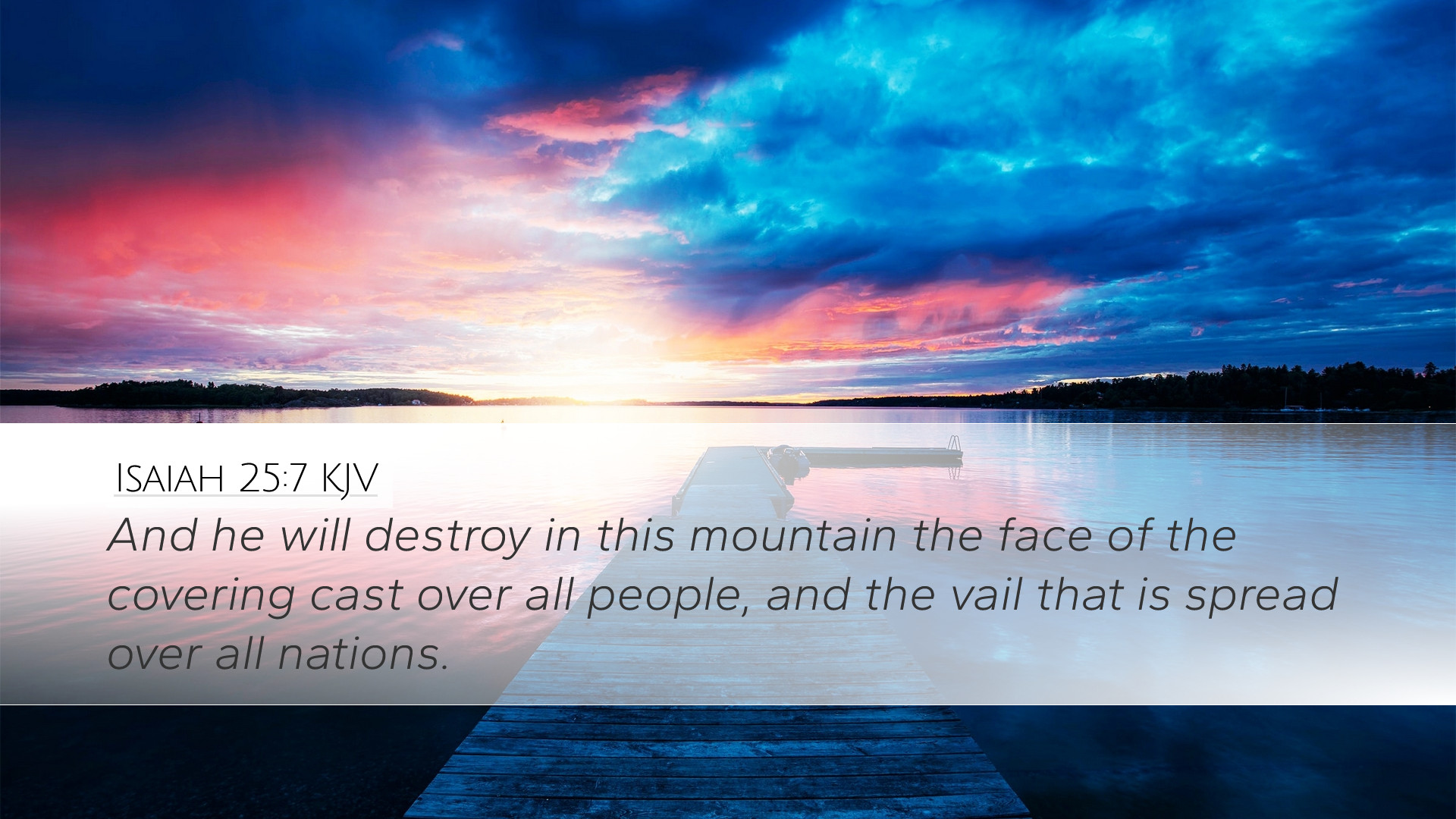Commentary on Isaiah 25:7
The verse Isaiah 25:7 reads:
"And he will destroy on this mountain the shroud that is over all peoples, the sheet that covers all nations."
Introduction
This verse is a part of one of the most profound prophetic proclamations of hope found in the Book of Isaiah. It is embedded within a passage that outlines God’s ultimate victory and the comforts that accompany His salvation. This commentary synthesizes insights from several prominent public domain sources, including Matthew Henry, Albert Barnes, and Adam Clarke. The aim is to provide a comprehensive understanding that can enrich the study of pastors, students, theologians, and Bible scholars alike.
Contextual Background
Isaiah, often referred to as the "fifth evangelist," brings forth messages of judgment as well as grace. Chapter 25 is particularly pivotal as it contrasts the impending judgment on the nations with the glorious salvation that God promises for His people. This verse specifically points to God's intervention in the face of despair and death, which serves to enhance the prophetic hope for redemption.
Historical Context
Historically, the nation of Israel was subjected to various oppressors. Isaiah prophesied during a time of political turmoil, offering a glimpse of hope that transcends temporal troubles. This chapter promises an eschatological vision wherein God will eradicate sorrow and death, providing not only physical deliverance but a spiritual renewal for His people.
Exegesis of Isaiah 25:7
In unraveling the meaning of Isaiah 25:7, we observe the metaphor of a shroud or covering, which indicates depth and weight associated with death and despair. The verse suggests a transformative act by God where He will lift these coverings from the nations, symbolizing liberation from oppression and the gift of life.
God's Delivering Power
Matthew Henry emphasizes that the “shroud” symbolizes a covering of death—representing loss, mourning, and the finality of life. Henry notes that God’s victory over death is central to Christian understanding, pointing to the resurrection of Christ as the ultimate fulfillment of this promise.
The Universal Scope
Albert Barnes highlights the significant phrase "over all peoples" and “all nations.” He interprets this as an indication of God's intention to extend salvation beyond Israel, holding a profound promise that all humankind will experience God's redemptive work. This notion can inspire a broader theological discussion regarding the inclusivity of God’s salvific plan.
Spiritual Implications
Adam Clarke offers a theological perspective on how this promise reveals the character of God—the God who desires to eliminate the veil of sin and death, a reflection of His redemptive nature. Clarke encourages believers to see this verse not only as a future hope but also as a current reality, encouraging them to consider the implications of living in light of God’s promised deliverance.
Theological Reflections
Hope and Assurance
The overarching theme of Isaiah 25:7 is hope. For those facing the “shrouds” of their lives, whether through grief, oppression, or despair, this verse serves as a powerful reminder of God’s imminent salvation. It asserts the reality that God is committed to reversing the effects of sin and death, revealing His glory in the process.
Eschatological Significance
This passage carries profound eschatological significance, pointing to the end times when God will restore and make all things new. Both Schmidt and Clarke offer insights that awaken readers to the anticipation of Christ’s return, where the final victory over death will be fully realized.
Application for Today
- For Pastors: This passage serves as a source of hope in preaching, particularly for communities facing despair. Pastors can draw from the rich imagery of God’s redemptive work as they counsel and encourage their congregations.
- For Theology Students: Isaiah 25:7 is a gateway into discussions on soteriology (the study of salvation) and eschatology. The inclusion of nations invites exploration of the comprehensive nature of God’s plan for humanity.
- For Bible Scholars: This verse provides an excellent platform for textual criticism and understanding the historical context of Isaiah’s prophecies. Scholars may investigate the literary devices and prophetic forms employed throughout the book.
Conclusion
Isaiah 25:7 is a transformative verse that encapsulates God's promise to remove the burdens of death and despair from His people. Drawing from the insights of revered commentaries, we gain a richer understanding of this promise and its implications for faith, hope, and God's ultimate plan for humanity. As we meditate on this text, let us hold fast to the assurance that God will indeed bring forth a new reality where death is no more and joy prevails.


